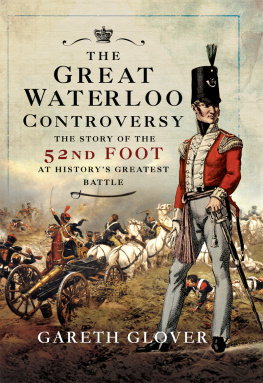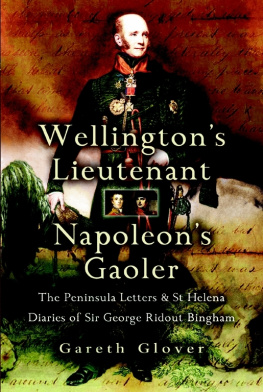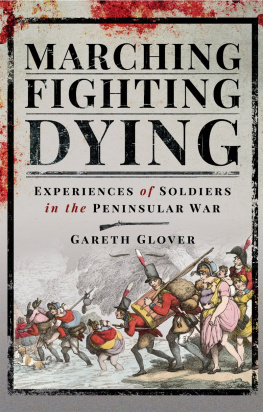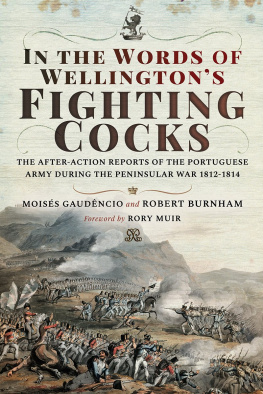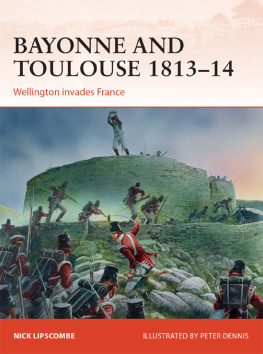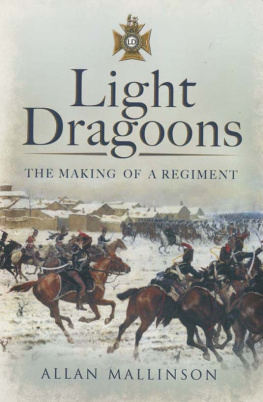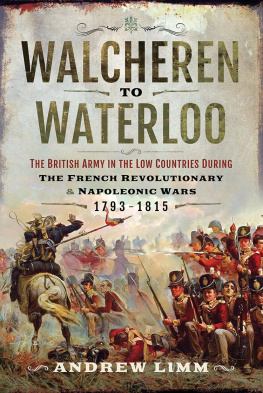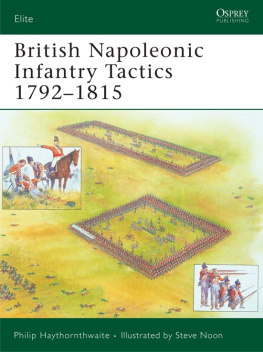WITH WELLINGTONS HUSSARS IN THE PENINSULA AND AT WATERLOO
The Journal of Lieutenant George Woodberry, 18th Hussars
First published in 2018 by Frontline Books,
an imprint of Pen & Sword Books Ltd,
47 Church Street, Barnsley, S. Yorkshire, S70 2AS.
Copyright Gareth Glover, 2018
The right of Gareth Glover to be identified as the author of the relevant section of the work has been asserted by him in accordance with the Copyright, Designs and Patents Act 1988.
ISBN: 978-1-47389-397-9
eISBN: 978-1-47389-399-3
Mobi ISBN: 978-1-47389-398-6
All rights reserved. No part of this publication may be reproduced, stored in or introduced into a retrieval system, or transmitted, in any form, or by any means (electronic, mechanical, photocopying, recording or otherwise) without the prior written permission of the publisher. Any person who does any unauthorized act in relation to this publication may be liable to criminal prosecution and civil claims for damages.
CIP data records for this title are available from the British Library
For more information on our books, please email: ,
write to us at the above address, or visit:
www.frontline-books.com
Foreword
M y interest in the journals of Lieutenant George Woodberry of the 18th Hussars was initially pricked by contact from a good friend of mine, Colin Yorke, who had previously worked with me on the publication of the Journal of Ensign John Drummond of the Coldstream Guards. He informed me that he had obtained a copy of Woodberrys journal held by the National Army Museum in Chelsea, which covers the period from January to September 1813 only but on further investigation I became really intrigued when I realised that the journals of George Woodberry had only ever been published fully in 1896 by Georges Helie in French! The French version also interestingly covered a much greater expanse of time, covering Georges service from January 1813 right up until July 1815. Even more extraordinary was the discovery that the French version of early 1813, which covered the same period as the handwritten journal held by the National Army Museum, differed significantly in their content; not in the basic facts thankfully, but in the finer detail, each making mention of certain aspects which were not duplicated in the other with some dates also omitted in the French version. These idiosyncrasies had also been noted by Peter Hicks, a British professor who works with the Fondation Napoleon, who republished Woodberrys account, having added in the missing dates from the British version, but again only published in French. The handwriting in the English journal has been compared with the image of the one page we have of the notebook containing Woodberrys account as used in the French version by Helie. It is certainly identical, so why were there two versions of the same journal?
By now, my interest was definitely piqued and I decided to work with Colin on publishing the entire Woodberry journals for the very first time in English. This is the result, which I trust that the reader will find is an invaluable primary source on the life of a young hussar officer in Wellingtons army, one which has for far too long been largely ignored in the Anglo-Saxon world simply because it was only available in the French language. Unfortunately, all records of the whereabouts of the journals Georges Helie was able to view and translate are now lost, but clearly, they were in France and with that country having suffered much in two world wars, it has to be presumed that the original journals no longer exist.
Georges handwriting style is very fluid and quite neat in comparison with many of the scrawls the editor has had to grapple with previously. It is written by someone who was not only highly educated, but Woodberry was clearly a gifted writer and story teller and although he starts writing the daily journal reluctantly, it is clear that it soon became a source of comfort to him and was no longer a chore. There is some possibility that George may have preserved the journals with a view to publication, but if so it never came to fruition in his lifetime and there is thankfully no real evidence of wholesale amendments at a later period. The journal entries are fresh and uncluttered with the dreaded hindsight; humorous but also devastatingly blunt and honest at times; often providing the unvarnished truth as he saw it and he was also an incorrigible rumour monger.
In all, his journals are fascinating, scandalous and entertaining all at once, whilst the editor has found evidence to back up every statement he makes, even down to the British officers accused of cowardice at Waterloo, who were quietly persuaded to resign their commissions instead of causing great embarrassment by having to hold Court Martials weeks after the greatest victory of the British Army.
It must also be said, that George Woodberry is throughout, an enigmatic figure, his family, even his birth and death are still shrouded with some mystery, but a great deal of investigation work carried out by Colin, myself and the contacts we have managed to develop in Venezuela, have now answered most of the questions about his life, although frustratingly a number of gaps do still remain. If the publication of his journals leads to any further discoveries regarding the life and death of George Woodberry, the editor would gratefully receive such information via the publishers.
George Woodberry states that he was born on 13 April 1792 of
Claines. His grandfather (also a George) was baptised at Pershore near Worcester and married Hannah Mills at Claines on 22 January 1760. Our George was the son of the next generation of George Woodberrys who married his mother Maria (nee Pitman), in Claines on 18 July 1786. Two baptisms can be found in Claines for their children, William on 1 May 1787 and Elizabeth on 25 January 1791, there are however no records of a baptism for our George in 1792.
It is also unclear how the family made its money, as there are no records of commercial enterprises, deeds or wills to indicate their occupations; however the fact that his father was apparently a close friend of Lieutenant General Sir John James Hamilton, 1st Baronet (17551835) of Woodbrook near Strabane in Ireland, who was a highly respected and experienced officer of the Honourable East India Company, the British and Portuguese Army, there is more than a suspicion that his father made his money as a merchant, trading with the far east, but he probably was not a member of the East India Company himself, as he cannot be found in their records and he was settled in Worcester and fathering a number of children before he was beyond the age of thirty. The idea of the family trading is further backed up, by Georges own statement that his elder brother William had died in Surinam in South America on 19 August 1809, because he does not appear to have served with the Royal Navy and therefore was almost certainly there carrying out mercantile operations of some kind.


